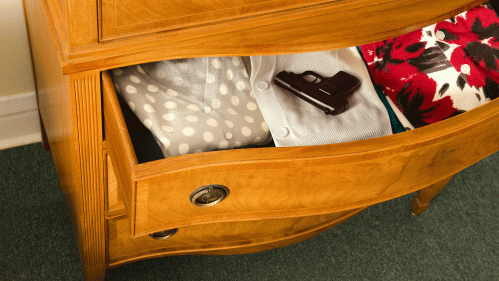Many Owners See Little Value in Storing Their Firearms Securely

Rutgers researchers find that firearm owners who store their firearms loaded and unlocked view secure storage as ineffective in preventing theft, suicide and unintentional shootings
With more than 400 million privately owned firearms in circulation across the United States, gun violence prevention efforts have emphasized secure firearm storage as a method for preventing injury and death. But some owners may not see the value in doing so, according to Rutgers researchers.
Despite evidence that secure storage can effectively reduce the risk of suicide and unintentional shootings, many firearm owners typically keep at least one firearm stored loaded and unlocked, quickly accessible in case of home invasion. One possible explanation is that firearm owners simply may not see value in storing their firearms unloaded, locked up, and separate from ammunition.
A study published in the journal Suicide and Life-Threatening Behavior by the New Jersey Gun Violence Research Center at Rutgers University addressed this question by collecting a representative sample from five diverse states in mid-2022 and assessing whether firearm owners who store their firearms loaded and unlocked see less utility in specific storage practices for preventing firearm theft, unintentional shootings and suicide.
“The most common reason for owning a firearm is protection at home, so many firearm owners view their firearms as tools to have on the ready in case of home invasion,” said Michael Anestis, executive director of the New Jersey Gun Violence Research Center at Rutgers and lead author of the study.
The researchers surveyed a representative sample of English-speaking adults from five states: New Jersey, Minnesota, Mississippi, Colorado and Texas. These states were chosen because they vary widely from one another geographically, politically and culturally and have broadly different firearm policies and rates of gun violence. The researchers then selected 941 the firearm owners in their sample and examined whether those who typically store at least one firearm loaded and unlocked (23.6% of firearm owners) perceive less value in specific firearm storage practices.
The researchers found that firearm owners generally viewed most secure firearm storage practices as more effective at preventing suicide and unintentional shootings than in preventing firearm theft. For both firearm theft prevention and suicide prevention, those who stored their firearms loaded and unlocked saw less value in storing firearms unloaded, separate from ammunition, in a locked location (e.g., a gun safe) and with a locking device (e.g., a cable lock) installed. For unintentional shootings, those who stored their firearms loaded and unlocked saw less value in storing firearms in a locked location.
“If firearm owners are unaware of the suicide prevention value of secure firearm storage practices, it makes sense that they opt to have at least one firearm in their home stored loaded and unlocked,” said Anestis. “The problem is, staging a firearm so it is so quickly accessible dramatically increases the risk for injury and death, so these perceptions are causing firearm owners to put themselves and their families in danger.”
The researchers said their findings are consistent with the notion that many firearm owners do not see suicide, theft, and unintentional shootings as likely outcomes in their homes. Although this may be true for many firearm owners, the risk for these outcomes nonetheless remains higher than the risk of an armed home invasion, which means that firearm owners are making risky storage decisions based upon faulty cost-benefit analyses.
“The risk for armed home invasion requiring defense with a firearm is not zero, but it is lower than the risk of suicide and unintentional shootings,” Anestis said. “If firearm owners are misperceiving the risks associated with securely and unsecurely stored firearms, that means they are making important decisions for their homes and families based upon faulty information.”
Anestis added: “Our findings highlight how important it is to help firearm owners see that, while it is their right not only to own a firearm, but to keep it in their home in a manner that aligns with local laws and their personal values, the decision to store a firearm loaded and unlocked is putting them, their loved ones and their communities at severe risk. As of now, that message is not getting out there the way it should be.”



